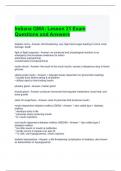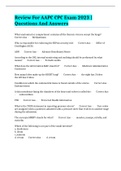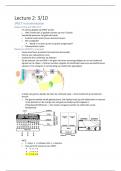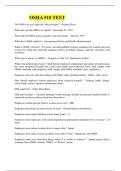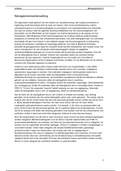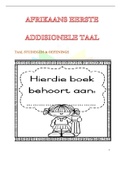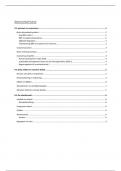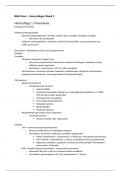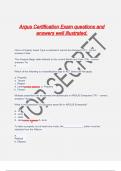Summaries IP by chapter
Chapter 11 – Why is the world divided territorially?
Division of the world into separate territorial units (states) is both artificial and arbitrary. It reflects a
particular relation to space; different than hunter-gatherers, who do not have fixed dwellings and
may move with the seasons. This difference may cause a clash between a modern state and its
territorial claims. Territory: area of ‘bounded space’ or ‘bordered power container’.
Key things of the state:
- Community
- Legitimacy
- Violence
- Territory
The state has absolute authority within its territory; unlimited (state can do what it wants) and
undivided (no other body has that power) and also exclusive internal sovereignty (jurisdiction within
their own borders) and equal external sovereignty.
Rise of the state: Augsburg 1555 ‘cuius regio, eius religio’ and the Treaties of Westphalia in 1648.
The state predates the nation. Talking about the nation-state is problematic because
1. They are not the same thing; nation = group of people, state = political unit.
2. The equation of the nation with the state fails to note the historical and contingent
development of each term.
The European model of territorial division was exported to the rest of the world: ‘what you will have
is what you possess.’ Initially this was as colonial possessions, but when they gained independence
they largely inherited the boundaries of colonial division. Self-determination (govern themselves)
again became very popular. However, it is rare for national groups to neatly fit into discrete
geographical areas.
Human relations to space can be understood through modes of behaviour.
Biological perspective: deriving insights from comparing human behaviour to that of animals.
Social angle: geo-political strategy instead of vital instinct; territory is a social construct.
Political-economic approach sees territory as a form of property. Marxist accounts suggest that
development in economics is important. Though in the Middle Ages, feudalism puts a great deal of
focus on land, it was only with capitalism + emerge of modern state that there was a real emphasis
on people and land as assets. This was tied to increasing importance of private property, growth of
new towns and industrialization, which led to a stress on the importance of national markets rather
than local ones + widespread centralisation and control of its land (territory). This political control
revolved around possession of land; people were much less important.
Political-strategic approach: territory emerges as important for strategic reasons and issues around
security. Power relations are important in understanding control of space.
Challenges for state control:
- Rise of supra-national organisations takes over key aspects of the role of states
- Globalisation/deterritorialisation/supra-territorialisation: territory no longer fixed, broader
spaces of interaction
- People’s movement worldwide requires us to rethink notions of identity etc.
- Environment; produces problems and requires broader solutions
Development of involvement of the international community: ‘global was on terror’, which led to
the logic of intervention.
Chapter 11 – Why is the world divided territorially?
Division of the world into separate territorial units (states) is both artificial and arbitrary. It reflects a
particular relation to space; different than hunter-gatherers, who do not have fixed dwellings and
may move with the seasons. This difference may cause a clash between a modern state and its
territorial claims. Territory: area of ‘bounded space’ or ‘bordered power container’.
Key things of the state:
- Community
- Legitimacy
- Violence
- Territory
The state has absolute authority within its territory; unlimited (state can do what it wants) and
undivided (no other body has that power) and also exclusive internal sovereignty (jurisdiction within
their own borders) and equal external sovereignty.
Rise of the state: Augsburg 1555 ‘cuius regio, eius religio’ and the Treaties of Westphalia in 1648.
The state predates the nation. Talking about the nation-state is problematic because
1. They are not the same thing; nation = group of people, state = political unit.
2. The equation of the nation with the state fails to note the historical and contingent
development of each term.
The European model of territorial division was exported to the rest of the world: ‘what you will have
is what you possess.’ Initially this was as colonial possessions, but when they gained independence
they largely inherited the boundaries of colonial division. Self-determination (govern themselves)
again became very popular. However, it is rare for national groups to neatly fit into discrete
geographical areas.
Human relations to space can be understood through modes of behaviour.
Biological perspective: deriving insights from comparing human behaviour to that of animals.
Social angle: geo-political strategy instead of vital instinct; territory is a social construct.
Political-economic approach sees territory as a form of property. Marxist accounts suggest that
development in economics is important. Though in the Middle Ages, feudalism puts a great deal of
focus on land, it was only with capitalism + emerge of modern state that there was a real emphasis
on people and land as assets. This was tied to increasing importance of private property, growth of
new towns and industrialization, which led to a stress on the importance of national markets rather
than local ones + widespread centralisation and control of its land (territory). This political control
revolved around possession of land; people were much less important.
Political-strategic approach: territory emerges as important for strategic reasons and issues around
security. Power relations are important in understanding control of space.
Challenges for state control:
- Rise of supra-national organisations takes over key aspects of the role of states
- Globalisation/deterritorialisation/supra-territorialisation: territory no longer fixed, broader
spaces of interaction
- People’s movement worldwide requires us to rethink notions of identity etc.
- Environment; produces problems and requires broader solutions
Development of involvement of the international community: ‘global was on terror’, which led to
the logic of intervention.



